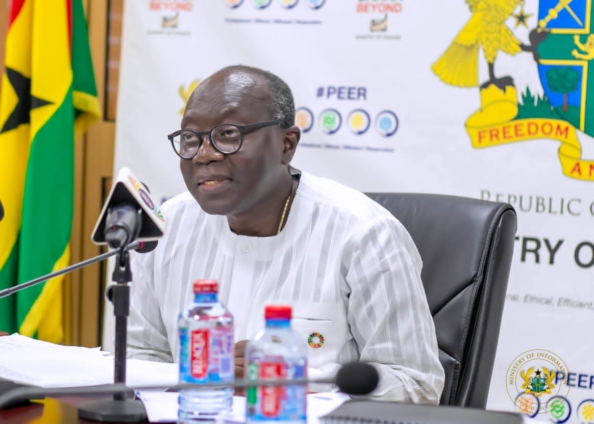Finance Minister, Ken Ofori-Atta has pointed out that the 2023 Budget is anchored on a seven-point agenda aimed at restoring macro-economic stability and accelerating Ghana’s economic transformation as articulated in the Post-COVID-19 Programme for Economic Growth (PC-PEG).
These comprise an agenda to aggressively mobilize domestic revenue, streamline and rationalise expenditures, boost local productive capacity, promote and diversify exports, protect the poor and vulnerable, expand digital and climate-responsive physical infrastructure and implement structural and public sector reforms.
To achieve these, Mr. Ofori-Atta said there are three critical imperatives which are; successfully negotiating a strong International Monetary Fund programme, coordinating an equitable debt operation programme; and attracting significant green investments.
“This will enable us to generate substantial revenue, create needed fiscal space for the provision of essential public services and facilitate the implementation of the PC-PEG programme to revitalise and transform the economy”, he stressed.
“We will undertake the following actions, initiatives, and interventions under the seven-point agenda”, Mr. Ofori-Atta added.
To aggressively mobilize domestic revenue, the Finance Minister said the VAT rate has been increased by 2.5% to directly support roads and digitalization agenda, the fast-tracking of the implementation of the Unified Property Rate Platform programme in 2023 and the review of the Electronic Transaction Levy Act and more specifically, reduce the headline rate from 1.5% to one percent 1% of the transaction value as well as the removal of the daily threshold.
To boost local productive capacity, Mr. Ofori-Atta said government will among others cut the imports of public sector institutions that rely on imports either for inputs or consumption by 50% and will work with the Ghana Audit Service and the Internal Audit Agency to ensure compliance, and others.
To promote exports, he disclosed that government will among others expand productive capacity in the real sector of the economy and actively encourage the consumption of locally produced rice, poultry,
vegetable oil and fruit juices, ceramic tiles among others.
To pursue efficiency in government expenditures, he said government will among others implement the Government directives on expenditure measures.
Latest Stories
-
ORAL: We won’t witch-hunt, we’ll focus on transparency, not revenge – Ablakwa
8 minutes -
Bawumia joins thousands in Kumasi for burial prayers for Ashanti Regional Imam
3 hours -
Blue Gold Bogoso Prestea Limited challenges government actions in court
3 hours -
Verdicts due for 51 men in Pelicot mass rape trial that shook France
3 hours -
Syria not a threat to world, rebel leader Ahmed al-Sharaa tells BBC
4 hours -
Patrick Atangana Fouda: ‘A hero of the fight against HIV leaves us’
4 hours -
Trinity Oil MD Gabriel Kumi elected Board Chairman of Chamber of Oil Marketing Companies
5 hours -
ORAL campaign key to NDC’s election victory – North America Dema Naa
5 hours -
US Supreme Court to hear TikTok challenge to potential ban
5 hours -
Amazon faces US strike threat ahead of Christmas
6 hours -
Jaguar Land Rover electric car whistleblower sacked
6 hours -
US makes third interest rate cut despite inflation risk
6 hours -
Fish processors call for intervention against illegal trawling activities
6 hours -
Ghana will take time to recover – Akorfa Edjeani
6 hours -
Boakye Agyarko urges reforms to revitalise NPP after election defeat
7 hours

